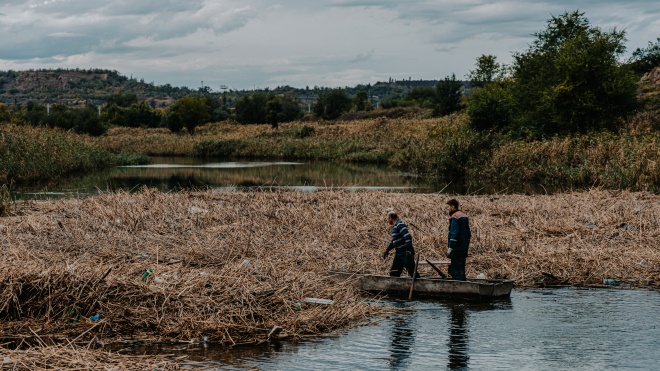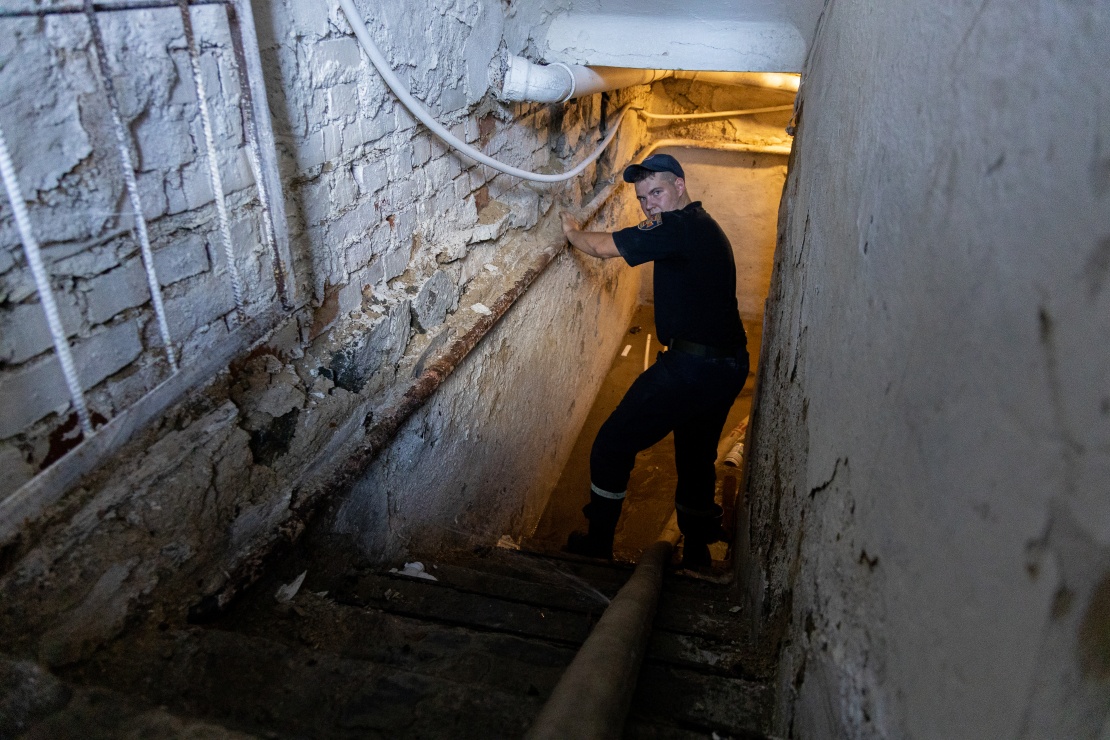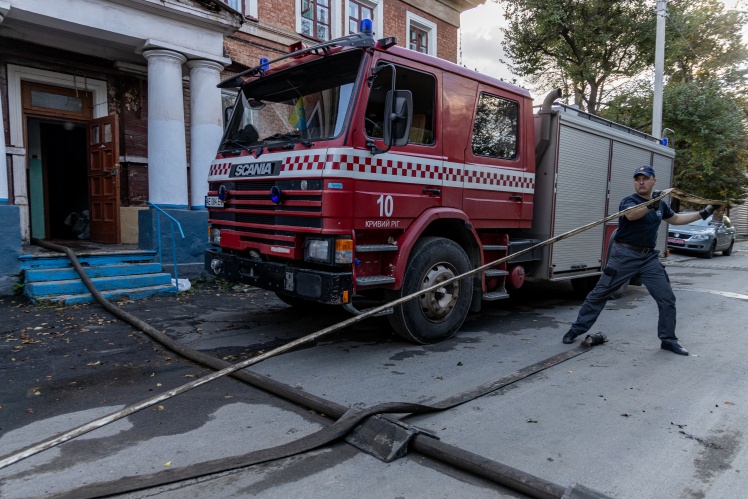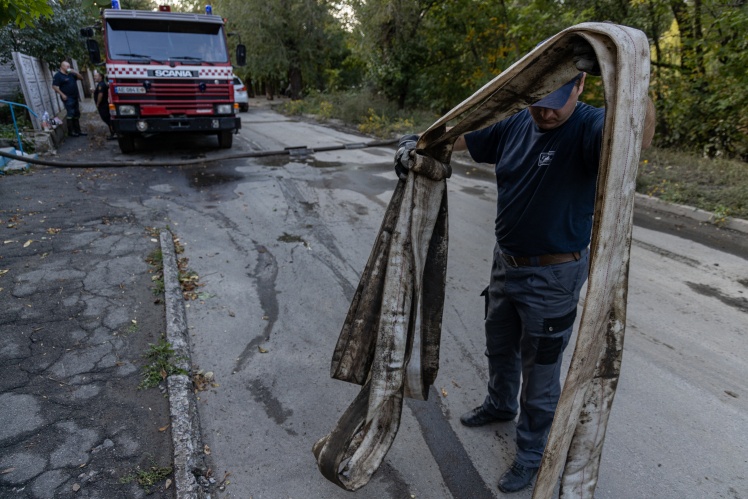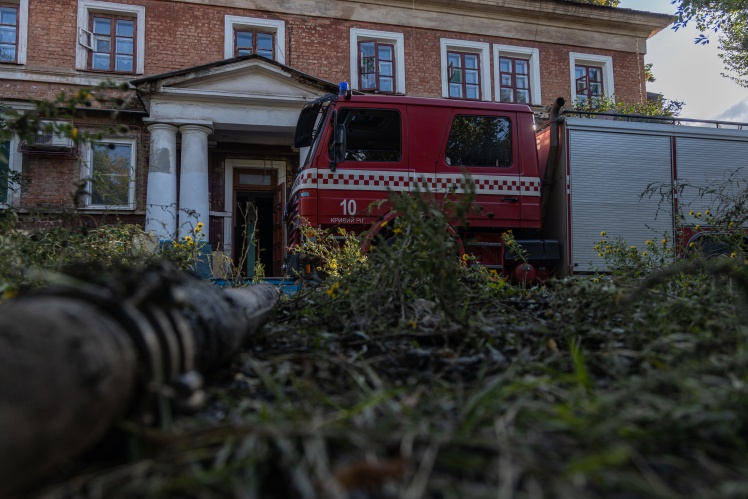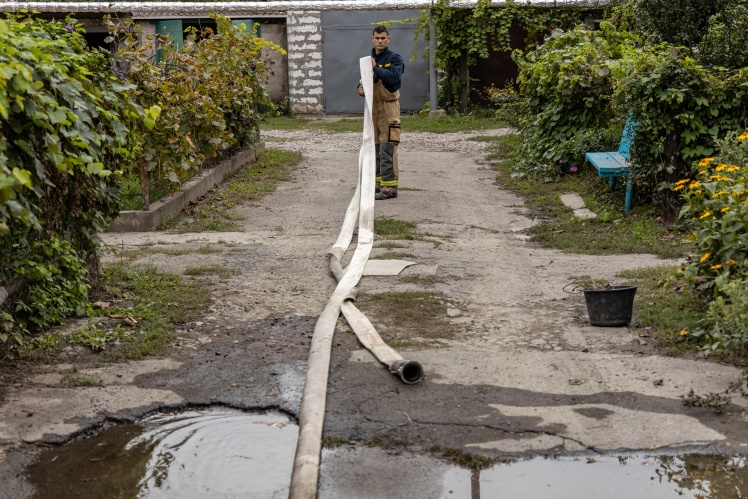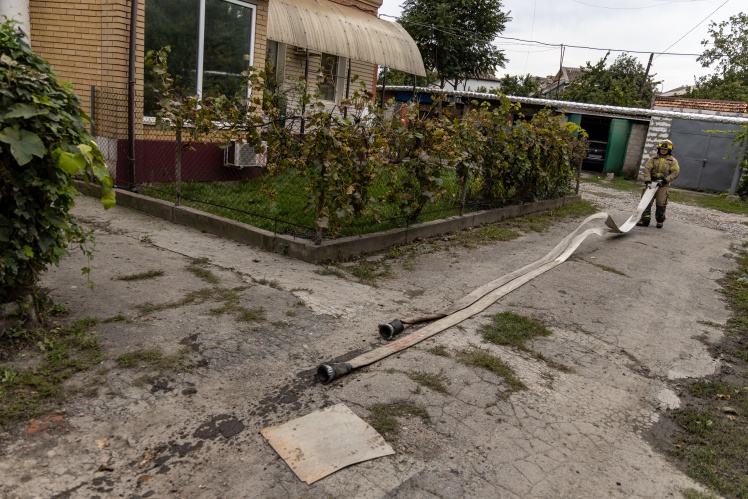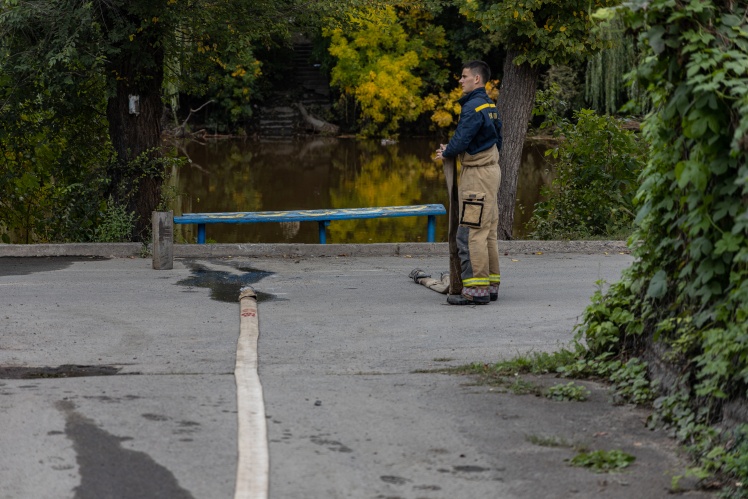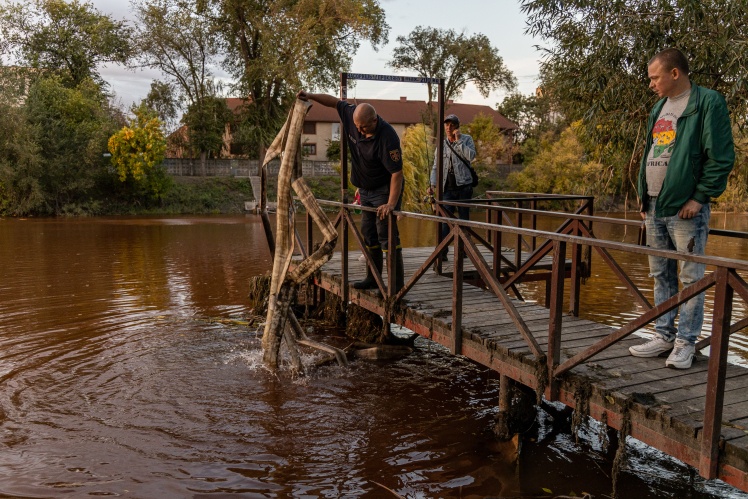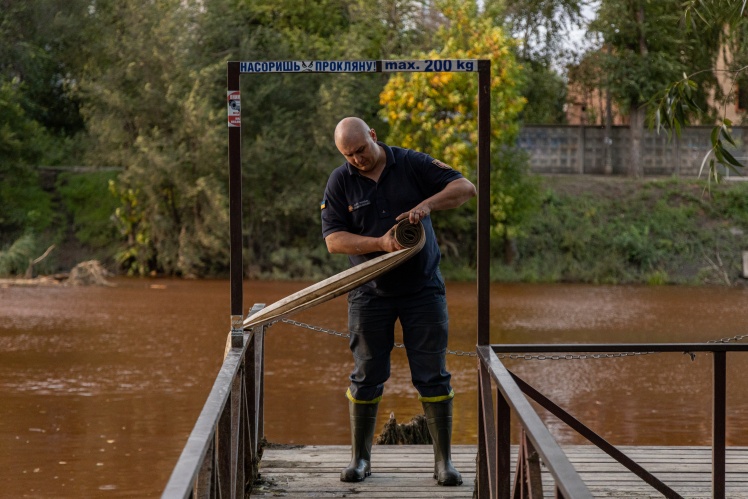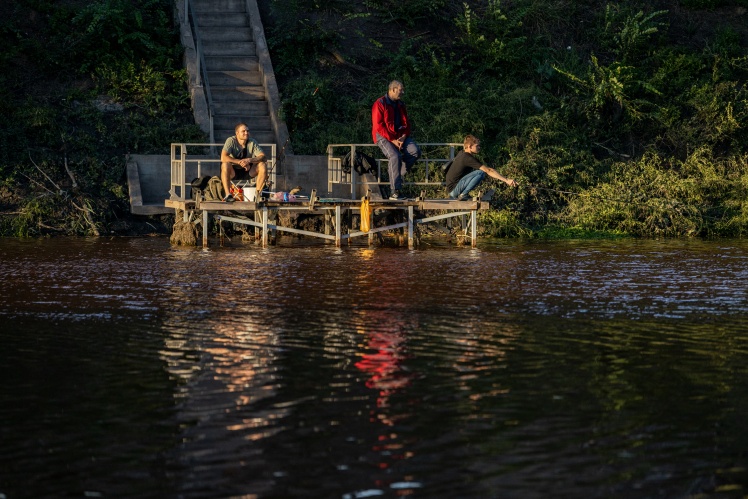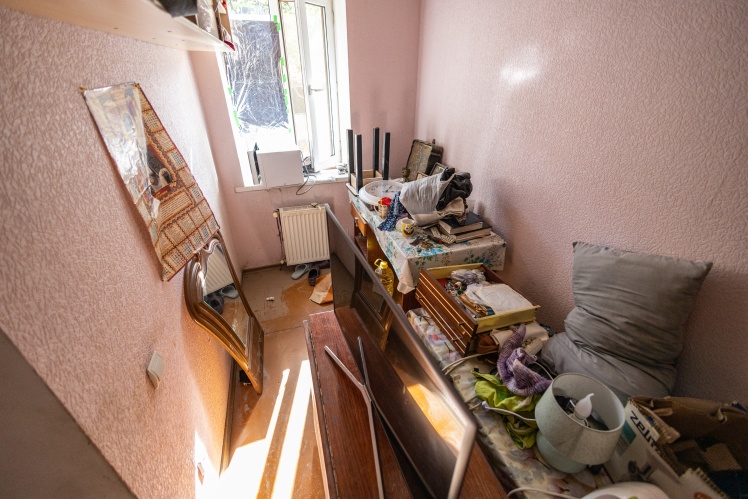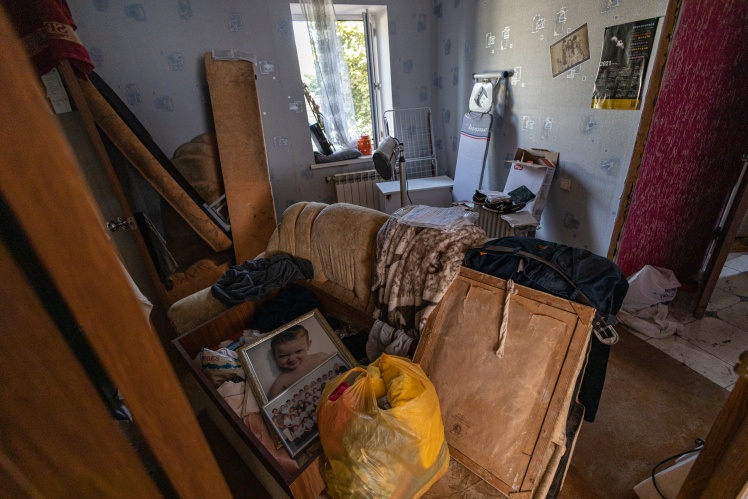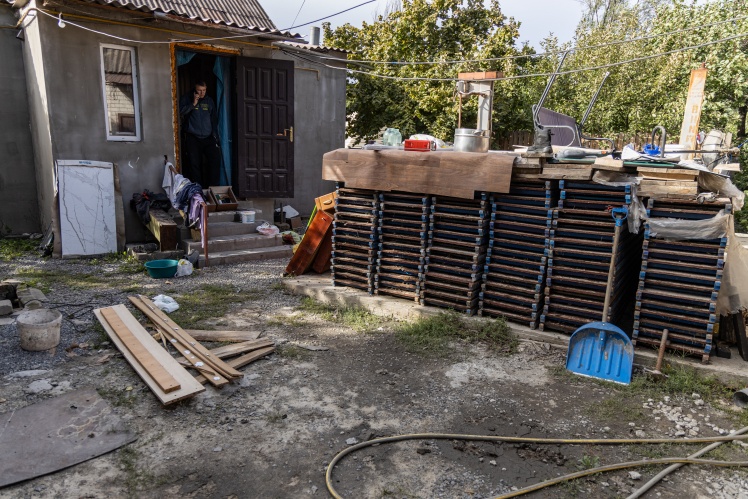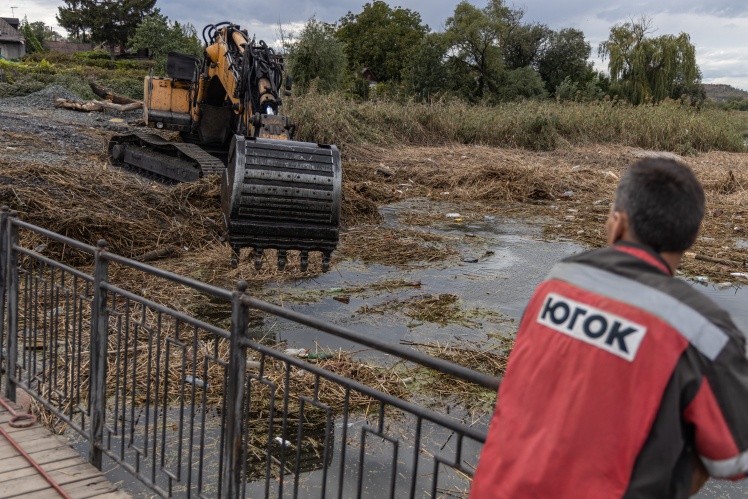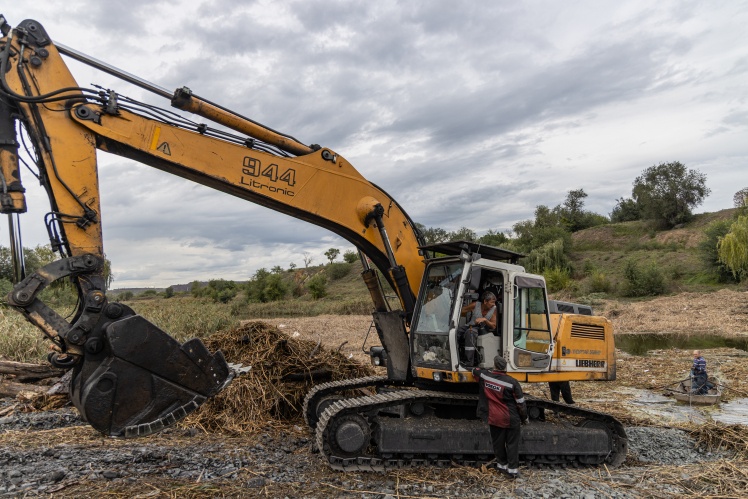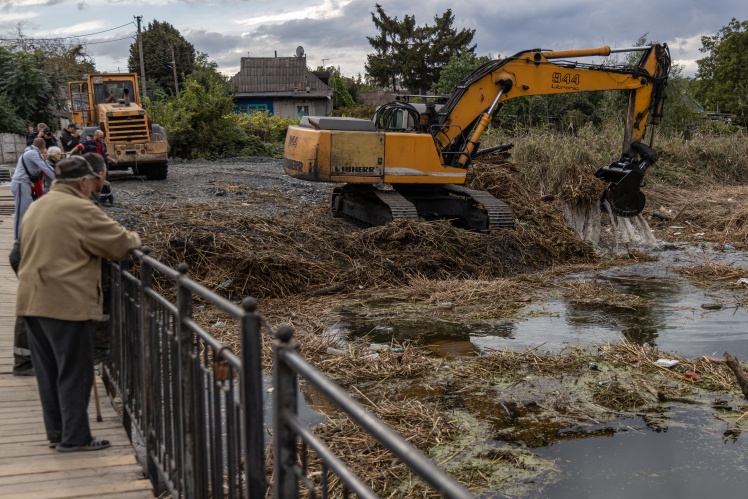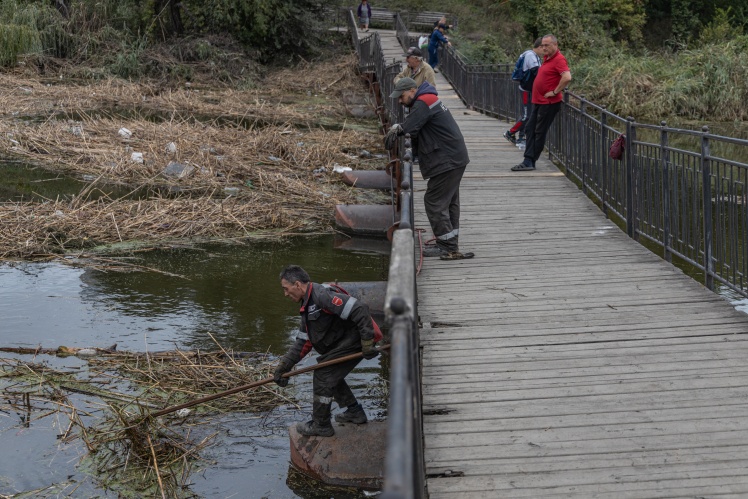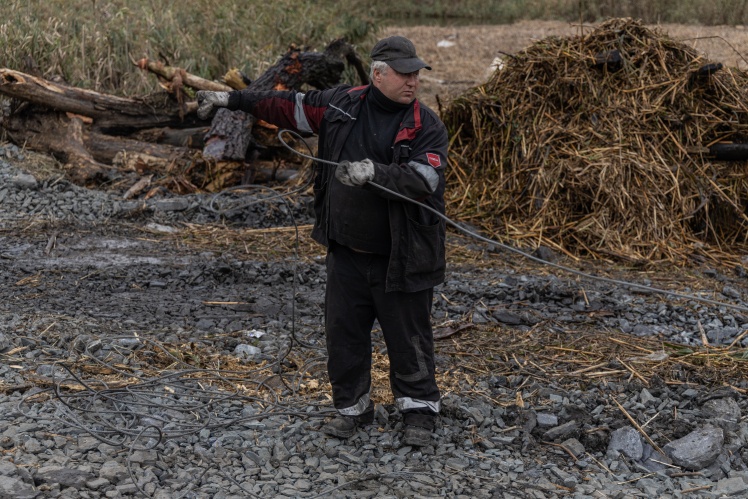Ingulets is red
Yordanska Street. A small two-story apartment building, built, as locals proudly say, by captured Germans after the Second World War. Old cramped basement. Itʼs impossible to go down here without high rubber boots: a few days after the shelling of the dam on Ingulets, water is still flooding the cellars. Now it has risen above the ankles and is slowly coming. A dim yellow light spreads from under the ceiling along the walls, a pump is creaking loudly in the corner. Localʼs belongings float in the rooms — mostly glass jars. In a few minutes, it starts to feel dizzy: either from the smell of moldy walls, or from fuel fumes, or from the crowding. Or maybe from everything altogether.
Stas Kozlyuk / «Babel'»
Itʼs getting lighter on the street. A fire engine stands a few meters from the entrance. A group of rescuers has gathered around: they are pumping water out. The men drink tea, laugh and check the pump from time to time. I take some photos. One of the firefighters notices this: he is slightly taller than average, with a shaved head. He looks about 40, doesnʼt give his name.
“Donʼt take pictures of us, please. Again people will say we are not doing our job,” says the fireman. “Although what kind of work can be done here now? We installed a pump, threw a sleeve, threw another sleeve into the basement, turned it on. Letʼs see how it pumps water out. As we finish with one basement — will move to another. And itʼs like this all day. The day before yesterday, for example, we worked like this until eight in the evening.
Stas Kozlyuk / «Babel'»
Near the fire engine, on a bench above the river, two retired women are sitting with a dog. They carefully observe the work of rescuers. We wonder how they survived the shelling of the dam and whether they left after the high water came.
“Of course, it was scary. It seems to be September 15, sometime in the evening. The explosions were heard very well. And after some time, the water in Ingulets began to rise. The street was flooded, the water in the houses stood at the level of the entrance to the apartments on the first floor,” says one of the women. She introduces herself as Tamara, but doesnʼt name her friend.
“Some of the locals left that evening, yes. They ran away with things and animals. The rescuers took them in boats to higher places where the water had not yet reached. I didnʼt leave, the only thing was that the rescuers took me out for a walk with the dog. Well, you understand, the dog needs to go to the toilet, and she couldnʼt do it either in the apartment or in the house...” — says Tamaraʼs friend, embarrassed.
“This happened here,” adds Tamara, “a neighbor was sailing down the street in a boat. He helped people. And they caught fish right on the road where cars drive. They said that there was a pike here. And crayfish too. And the water quickly receded, the next day the road was visible again. This, they say, is because the dam was blown up somewhere down the river.”
Stas Kozlyuk / «Babel'»
Tamaraʼs friend goes for a walk with the dog, while we stay on the bench. The old woman tells us the familyʼs history for a long time: how her grandfather fought, how her father worried about the White Guards, how he was denounced during Stalinʼs time, how they met the Second World War and were evacuated. Then the family moved several times. In the end, the woman stopped in one of the towns on the Amur River, where she gave birth to children. She survived the flood. And already at a more respectable age, returned to Ukraine, to Kryvyi Rih. And here she met the beginning of a full-scale Russian invasion.
“I donʼt understand why the Russians need all this. We all lived peacefully. And now they bomb us, talk about fascism. I have only one question: why donʼt we bomb Rostov? Or any other cities of theirs? Why do we, peaceful people, suffer, and the Russians donʼt? If I had my will, I would hit several cities with rockets so that these Russians would feel [how it is]...” Tamara says angrily.
We ask her if she saw Nazis in Kryvyi Rih. Or, maybe, fascists? The woman laughs.
“Which ones? Itʼs only the Russians. Although on the other hand, I donʼt understand why ours are fighting with monuments. This is history. And why the streets are being renamed... To Bandera. You know, an acquaintance told me that she saw a young Russian teacher go to Western Ukraine after the Great Patriotic War. Do you know what was done to her? She was tied to two birch trees [and torn apart],” she lowers her voice, it seems she is about to cry.
I am trying to explain that such stories should be treated with caution. However, the woman thought about something and did not hear my remarks about the similarity of Russian and Soviet propaganda. In the end, she says goodbye and goes to drink coffee with her friends. We are looking for the next house, from the basements of which water is pumped out. We find our firefighters several hundred meters away. They settled right on the shore, basking in the evening sun. Dirty water is pouring out from the fire hose. One of the rescuers, with a shaved head, went fishing from the pier.
Stas Kozlyuk / «Babel'»
Near the fire engine, local people are cleaning up the mud and soil brought by the water from Ingulets. As soon as one of the men notices the camera, he shouts loudly not to be photographed. We are trying to talk to someone from the local area. A woman of about 40 years old in a red jacket, Olena, agrees. She says that she heard the moment of the rocketʼs arrival very well.
“It was in the evening, maybe around 5 PM. I was supposed to leave work. The explosion was strong, the windows shook. Maybe in half an hour I came home. And after about an hour, the water began to arrive. It happened very quickly, like in some horror movie. First, Ingulets came out of the banks, then it began to flood the road, then the sidewalks, and then the water stood in the entrances”, says Olena quietly.
Stas Kozlyuk / «Babel'»
She says that on that day, many people from her street left for the upper parts of the city: some to acquaintances, some to relatives, to be away from the river. She stayed because she lives on the second floor.
“We used to catch fish on the street here. And when the water receded, we collected crayfish in the yards. Iʼm not lying. Though, my garage was flooded. The tools were damaged. And Iʼm not the only one. Some people had their cars floated. In a sense, the engines were flooded. But I didnʼt want to leave. Neither after the start of the war, nor after the dam was hit with a rocket. This is my country and my city. I wonʼt give the Russians such pleasure [of vacating the place]. You know, I lived in Russia for a while. And when I talked about the Russians at work — they didnʼt believe me”, the woman speaks with biting sarcasm in her voice.
Together with her family, she lived in Russia for a long time, went to school there. Already in her teenage years, she returned to Ukraine. Olenaʼs observations are not in favor of the "brothers".
“It was very difficult at school. How are Russians different? Hmmm, the kids at school were very angry. What is now called "bullies". Excuse me if I make mistakes, I donʼt speak Ukrainian very well yet,” Olena snaps suddenly. “Yes, children are angry. There it was impossible to stand out, to be different. If suddenly you are not like everyone else, they tried to humiliate you. Pulled you to the bottom. They demanded that you be like everyone else.”
Ukrainians, according to her observations, try more to help and support each other. Even if they donʼt know each other. Even if it happens in a city hit by rockets.
“Thatʼs why when I came back, I said that never again in my life my foot will step on Russian land. On that swamp. I think some Ukrainians have now understood this. And I canʼt even imagine how anyone here can still wait for the "Russian world". We donʼt need either Russia or Russians here. They have to get out of here.”
Olena apologizes and says she has to run to her garage to clean up after the flood.
It grows dark. The rescuers pull out the pump from the basement, load it into their car. A man with a shaved head goes to wash fire hoses from mud. He quickly throws them into the water from the pier, where he tried to fish an hour ago. The red waters of Ingulets are passing us by. Fishermen are sitting on the opposite bank. It seems that the color of the water does not bother them at all.
Stas Kozlyuk / «Babel'»
Ingulets is yellow
At night, the city quiets down: there is a curfew. But around midnight, a rumble echoes through the streets: these are loaded quarry dump trucks heading to backfill and strengthen the dam. In the morning, we go downstream to see the effects of the flood in other areas of the city.
At first glance, the private sector was hardly affected. There are no fire trucks pumping out water from basements, no muddy roads, and almost no traces of water are visible on the fences. Just near the very shore: here the concrete fence for some reason cracked and fell to the ground. We walk past the improvised parking lot — fishermen leave their cars there — to the farthest house. A man of medium height in a sports suit is just standing at the gate. Introduced by Vitaliy.
Stas Kozlyuk / «Babel'»
“Yes, I already had journalists. Many and different. But if you want, come in. Let me show you what the water has done”, he says.
In the middle of the large yard, scaffolding, which the owner of the house once rented out, is piled up. It can be seen that some of them swelled due to moisture. There is water in the pit (Vitaliy has his own garage). Itʼs hard to say for how many days: a strange thick film appeared on the surface, in which small debris floats — leaves, plastic and particles of dust. In the backyard, several men who work with Vitaliy in the workshop are trying to save the machine after the flood. They say they drained more than a liter of water from it, oiled it, and checked the electrical wiring.
“We grind steering columns here. In fact, this machine feeds us. I was afraid that it would drown, but, fortunately, the water didnʼt rise that high, — says Vitaly.
We enter the house. A strong smell of wet lime hits the nostrils. Things are being dried in the rooms: chairs, sofas, linen, appliances. Here and there you can find old black-and-white photographs and cups.
Stas Kozlyuk / «Babel'»
“When the water started to rise, I was at home. First, I took my mother to an apartment with friends, and then I returned and started saving the things I could. You know, I already thought I would have to start over my life. So I grabbed the documents, a change of clothes, some things. And a suit. Because how will you go into a new life without a suit? I have a minibus, it is a little higher than other cars. So I left here already by water. I remember that when I was running around the yard, the water was splashing,” — laughs the man.
We are standing in his kitchen, which was renovated not so long ago. Now there are water lines on the walls, and the equipment is unlikely to work. Neither a large refrigerator, nor a stove, nor a washing machine. Now itʼs just scrap. Vitaily does not yet know who will compensate for these losses.
“Some people from the local authorities came to me and described the damage. I forgot to tell them about the washing machine. But how they will count the losses, who will cover them — I donʼt know. I donʼt think the city has the money for that. Maybe they will do it somehow through international courts. But itʼs years and years. And you have to live now,” Vitaliy says calmly.
Suddenly he jumps up and says: “I forgot!” — and takes the shelves out of the closet by the door. He puts them out to dry in the sun. Pools of water form almost immediately under them. From the backyard the roar of the machine can be heard: itʼs being checked. Kostiantyn, one of Vitaliyʼs colleagues, is sorting through the tools nearby. He says that when the water came, he was at work, in the garage.
“We set out to save the tools. But I donʼt even remember how it was. I had a lot of different tools in my garage. Part of them was flooded with water, but, fortunately, nothing rusted, everything is working. While I was washing it, I was always surprised — how many keys and screwdrivers I have,” Kostiantyn laughs.
He takes us to the garage. Here, as in the house, the smell of slaked lime hangs in the air. The tools that the man mentioned is neatly laid out on the tables — they are drying. There is another pit for cars in the adjacent room. Flooded.
“You know, we donʼt even call the firemen anymore. Well, why bother people constantly? They pump out the water, and the next day it rises again. So Vitaliy bought a small Kärcher pump, we throw it into those holes, and it pumps water out. So to speak, we can manage on our own, says Kostyantyn.
Vitaliy arrives with a pump. The men wind the float from it to the rake, place it across the pit and lower the device to the bottom. In a few seconds, it turns on, water starts pouring from the hose led to the river. Vitaliy explains: the float must be attached to something, because due to the garbage in the pit and the different depths (the car pit has different depths at different ends), it does not always stay properly on the surface. As soon as it sinks under water, the pump stops working.
Stas Kozlyuk / «Babel'»
While Vitaliyʼs pump is working, we go to the neighboring house. The latter suffered no less: carpets are drying on the gates and fences, pillows are spread out in the yard and furniture (mostly sofas) is arranged. The garage is wide open, rotten potatoes are lying in the backyard and there are buckets of metal parts of unknown purpose. Oleksandr is in the yard, he looks over 50 years old with short gray hair. The man speaks slowly and sometimes irritated.
“I donʼt want to come back here. Do not want. I want to live in an apartment. This is to be honest. Because my house was already barely standing, and this flood just finished it off. If you are interested, come in, I will show you everything.”
We enter the old house, which until recently served as a summer kitchen. We are accompanied by the ubiquitous smell of slaked lime. The walls here were cracked. Part of the plaster fell from the ceiling. It seems that a little more and the building will collapse inward.
Stas Kozlyuk / «Babel'»
“I donʼt know what can be done about it. And is it necessary? This house is old, it used to be a summer kitchen. And the one I live in isnʼt really better. Itʼs just bigger. My parents once bought it. Their grandfather helped them. And he was too miser to give a few thousand [Soviet] rubles more to buy a house not on the shore and in better condition: this one cost 11 thousand, and he had to pay 13. As a result, he had problems with it. For example, when the windows were installed, it turned out that the frames under them were all crooked. Because the window is larger on one side, and smaller on the other. And after the flood, I donʼt know how to repair it. There is no money. There is nowhere to take them from.”
During the conversation, Oleksandr gestures actively. There are evil notes in his voice when he talks about his grandfather. When we go outside, the man points to a mountain of potatoes laid out in the sun.
“I had potatoes for the winter. Now I donʼt know how much it will be possible to save. You see, itʼs rotten. Maybe something will dry in the sun. It was in the cellar, it was flooded with water. And not only potatoes. Many things have sunk there. Part of preserves too. Only the lids above the water are visible. And the garage was flooded. This was an excuse to sort through everything,” Oleksandr shakes a bucket with metal spare parts with his hand. “Itʼs like: you collect it, collect it, think that someday you will need it. And as a result, this junk lies with you for years. After the flood, even though I sorted through the garbage, I will throw some of it away, there will be more space.”
Stas Kozlyuk / «Babel'»
The man escorts us to the gate. He stops behind them, leans on the hood of a yellow minibus. He tells how the commission tried to come to him and write down the damage, but he chased them away.
“Then they went to Vitaliy, my neighbor. They asked him why I was so angry. But why should I be good? Everything went down the drain for me. Even the flowers in the garden that I grew. I donʼt believe that anyone will compensate for these losses. I would gladly sell the house and move to an apartment somewhere. But how will you sell it now?”
The yellow waters of Ingulets are behind us. Fishermen also sit on the banks here. On the trees along the river, various garbage hangs: old reeds, plastic bottles, plastic bags — everything that the water carried with it. Now the river is shallow, it seems that it can be crossed easily. There used to be a concrete dam not far from Oleksandrʼs house, but when the Russians shelled a large dam upstream, our sappers blew it up to drain the incoming water. According to the locals from the surrounding houses, the dam was blown up several times. In fact, because of that, some concrete fences were demolished. We go downstream even lower.
Stas Kozlyuk / «Babel'»
Ingulets is rotting
A rumble, a roar and a screech are heard over Ingulets. This is the equipment of the Southern Mining and Processing Plant (locals use the Russian abbreviation YUGOK) sorting out the garbage that clogged the river. For hundreds and hundreds of meters upstream, there is no water to be seen — only black reeds and plastic garbage. The reason is simple: everything that Ingulets collected on the way from the breached dam to this point rested on the pontoon bridge in the village of Matryonivka. The workers are trying to remove the garbage with the help of one excavator and several trucks. A dozen locals have gathered on the pontoon bridge and are closely monitoring the process. Some of them even manage to catch fish and brag about their catch on camera.
Stas Kozlyuk / «Babel'»
We get closer to the cars and meet Victoria, a local. Sheʼs about 50, of medium height, black-haired, with fire in her eyes. The woman explains that she is a botanist, has been working with conservation funds for 16 years and teaches at a local school. And after the flood, she drives along Ingulets to assess the damage to the environment caused by the Russians.
“In peacetime, the river was washed twice a year: in April and October. Because there are mines and enterprises in Kryvyi Rih. And in order to avoid excessive mineralization, water was supplied to Ingulets from the Dnipro. This year, because of the war, it wasnʼt done. Therefore, I suspect, mineralization has increased. Plus, downstream, in the Kherson region, there were irrigation systems, but I donʼt know if they are working now,” says Victoria.
Meanwhile, the excavator collects reeds with a bucket, throws them into the back of the truck and carries the garbage along the narrow street. YUGOK employees are waiting for another car. At this time, they throw an anchor into the river, attach it to the excavator with a cable and try to pull the rotten reed closer to the shore. Engines roar tirelessly.
“The ecological situation has worsened, of course. Because the water rose sharply by 2-3 meters. Vegetation was disturbed, reeds were washed away. The gardens were flooded. Even toilets in the private sector. The entire sanitary protection zone was flooded. And imagine that all this washed into the river. Plus ordinary household garbage and dead fish. “I canʼt even imagine what the situation is like downstream, in the occupied territory,” continues Victoria.
YUGOK workers are walking on the reeds that Ingulets cut. Somewhere among this garbage, a boat can be seen, in which several more people are sitting — they are pushing water-pressed plants, which look more like small black and yellow islands, closer to the shore. Another man stands on the supports of the pontoon bridge and tries to push away the garbage with a rake. The next truck is approaching. The excavator starts raking the black reed again. The roar of the engines is accompanied by the splashing and gurgling of water.
Stas Kozlyuk / «Babel'»
“Now the main thing is to remove this garbage so that the river is restored. Because it is shallow. And if you leave organic matter here, it will start rotting. Then Ingulets will turn into a swamp in this place. And turtles, crayfish, mallards, seagulls, terns, and muskrats live here. There is even a needle fish. This is typical of a freshwater river. However, if it rots, all this can disappear,” Victoria takes her phone and goes to take pictures of the cleaning.
The YUGOK employee climbs onto the bridge, carefully puts the rake next to him, leans on the railing and looks at the work of the excavator. He says that they have already removed about two-thirds of the debris that was brought in by the flood. While we are talking, Victoriaʼs friend, Olga, approaches us. She is now a retired woman, once a teacher at a local university, a geologist. Together with Victoria, she has been driving along Ingulets for several days.
“The main thing is that the breach in the dam was eliminated in time. As I know, the hole was filled with rock from the quarries, which is mostly hematite. That is, a rock that oxidizes. Accordingly, the water became red in color, you may have seen it. Over time, this fine dust has settled, the river gradually clears and changes its color from red to yellow. But, of course, the biggest danger is dead organic matter. Because of this, the amphibians that live here can suffer greatly,” Olga explains quietly.
All of a sudden, the equipment quiets down. Itʼs almost three oʼclock. YUGOK employees say that for today their work is completed, they will continue tomorrow. We return to Yordanska Street, where another brigade of firefighters is working. Rescuers say they have work every day. Despite the fact that Ingulets has returned to the shores here, the water in the basements rises by about 15 centimeters. Communal workers — several women of retirement and pre-retirement age — are sitting in distance from the firefighters. They are waiting for a tractor to pick up garbage and tree branches from the street.
“You better ask this question to Svitlana, sheʼs a displaced person here, she can tell a lot of interesting things. We are waiting for the tractor, we were not here the first day after the flood,” the women laugh.
We approach Svitlana. Sheʼs about 60, originally from the Mykolayiv region, from the now-occupied town of Snihurivka. She currently works in communal services, and says succinctly.
“What to tell? I heard that immediately after the flood there was a lot of garbage on the street. I myself from Snihurivka, left it due to the occupation. How did I leave? I went on foot. Some car picked me up on the road, and thatʼs how I got to our military. And they already brought me to Kryvyi Rih. I have been here for several months. They gave me a room in a dormitory, and I got a job. I make ends meet somehow. But after the shelling of the dam, I donʼt even know, maybe Iʼll go further, to safer cities. Itʼs very scary here,” says Svitlana.
Stas Kozlyuk / «Babel'»
Several fishermen pass us. We ask how it is with fish in Ingulets.
“Pike were caught here on the road! But donʼt take pictures of us, weʼre just military, on vacation now. And, to be honest, the locals should be punished. You tell them, you explain: donʼt photograph the results of the missile hits, donʼt post them on the Internet. No, thereʼs a crowd of idiots filming on their phones. I donʼt even know what to do with it. Red color of the river? And what will happen to the fish? Itʼs normal, except its gills are covered with dust,” the men laugh and continue walking down the street.
A siren begins to wail in the distance. Another air alert is announced in Kryvyi Rih. However, few people pay attention to it: fishermen stay on the banks, utility workers wait for their tractor. A woman with a seven-year-old girl walks past us with quick steps. The girl notices the playground and rushes to it.
“Where are you going, you canʼt! We must run home quickly. The bombs are falling!”, woman explains.
A woman and a child disappear at the end of the street. The yellow waters of Ingulets make a quiet noise. A siren wails.
Translated from Ukrainian by Anton Semyzhenko.
Rescuers help the locals to cope with the consequences of enemy attacks. Your donations help Babel tell about war and victory. Support us: via Patreon 🔸 [email protected]🔸donate in cryptocurrency🔸in Ukrainian hryvnia.
